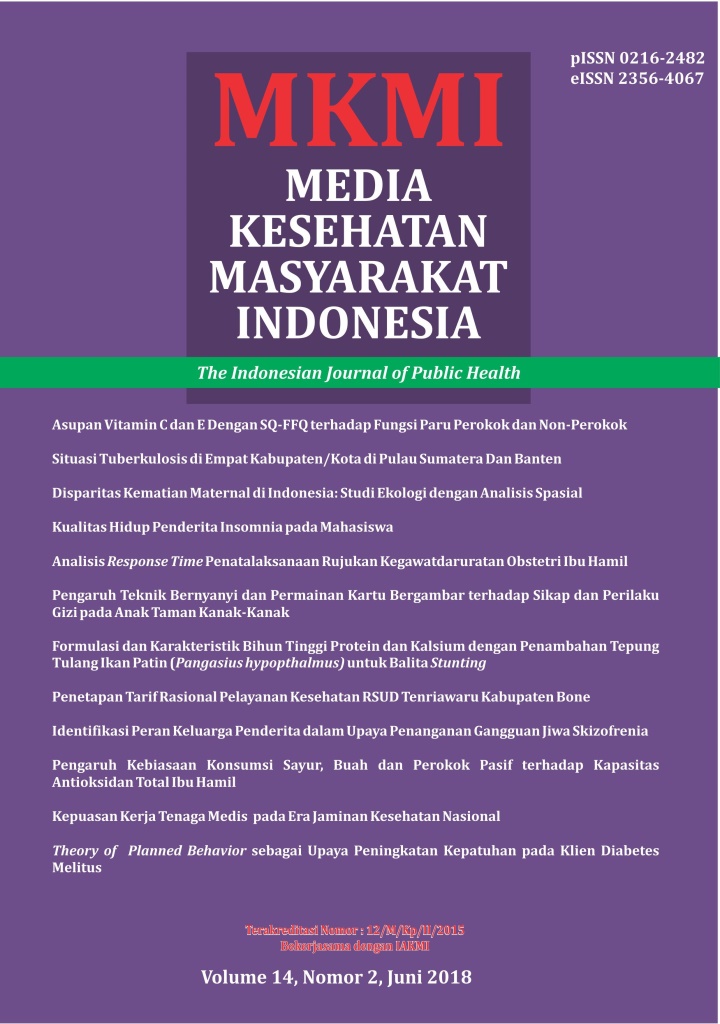Theory of Planned Behavior sebagai Upaya Peningkatan Kepatuhan pada Klien Diabetes Melitus
Abstract
Diabetes mellitus (DM) is a disease that often caused complications that require care and long-term
treatment. Preliminary study obtained from 10 respondents, 50% of clients difficult to comply with diet , 60% felt
tired and bored to the treatment of diabetes, 10% of clients have regular exercise , and 50% of clients said that
fear of complications of DM. The purpose of this study is developing model improved compliance based Theory
of Planned Behavior in client type 2 Diabetes Mellitus on Community Health Centre Gundih Surabaya. This
study used explanative observational with cross sectional approach. The population in this research is type 2
DM client who lives in community health centre Gundih Surabaya. Sampling technique used purposive sampling
and 100 patient obtained as a sample. The variables in this study were age, sex, education, knowledge, attitudes,
subjective norms, perceptions of control, intention, compliance management of diabetes and blood sugar levels.
Data collection was using questionnaire and analyzed using PLS (Partial Least Square). Statistic analysis result
shows there is significant relationship between attitude, subjective norm and percieved behavioral control toward
intention with t-value 13,935. There is significant relationship between intention with compliance with t-value
7,80.There is significant relationship between compliance and blood sugar level with t-value 4,592. Theory of
Planned Behavior (TPB) stated that behavior could effectd by intention, attitude, subjctive norm and percieved
behavioral control.
Full text article
References
Soegondo S, Soegondo P, Subekti I, editors. Penatalaksanaan Diabetes Melitus Terpadu. 2nd ed. Jakarta: Balai Penerbit FKUI; 2015. 3 p.
Soelistijo SA, Novida H, Rudijanto A, Soewondo P, Suastika K, Manaf A, et al. Konsensus Pengelolaan dan Pencegahan Diabetes Melitus Tipe 2 di Indonesia 2015. Jakarta: PERKENI; 2015. 1-77 p.
RISKESDAS. Riset Kesehatan Dasar 2013. Jakarta; 2013.
Lestari TS. Hubungan Psikososial Dengan Kepatuhan Diet Pasien Diabetes Melitus Tipe 2 Rawat Jalan Di Rsup Fatmawati. Universitas Indonesia; 2012.
Ajzen I. Attitudes, Personality, and Behavior. 2nd ed. Berkshire: Open University Press; 2005.
Fishbein M, Ajzen I. Predicting and Changing Behavior: The Reasoned Action Approach. New York: Psychology Press; 2010.
Thomas A. Santoso. kemandirian aktivitas makan, mandi dan berpakaian pada penderita stroke 6-24 bulan pasca okupasi terapi.pdf. Semarang; 2003. p. 5.
Jimmy B, Jose J. Patient medication adherence: Measures in daily practice. Oman Med J. 2011;26(3):155–9.
Nolan CJ, Damm P, Prentki M. Type 2 diabetes across generations: from pathophysiology to prevention and management. Lancet. Elsevier Ltd; 2011 Jul;378(9786):169–81.
Kapoor G, Mathur K. An analysis of diabetes empowerment and distress in patients of diabetes mellitus type 2. Indian J Heal Wellbeing. 2015;6(8):757–62.
Andriadi W. Faktor-faktor yang berhubungan dengan perilaku hidup bersih dan sehat anak remaja kelas VII dan VIII di SMP 258 kelurahan Cibubur Jakarta Timur tahun 2011. 2011.
Maradona. Hubungan Sikap Pelanggan, Norma Subjektif Pelanggan dan Kontrol Perilaku Pelanggan dengan Intensi Kepatuhan Pelanggan dalam Membayar Tagihan Jasa Telepon Rumah di Pt. Telkomunikasi Indonesia, Tbk Malang (Penerapan Teory Of Planned Behavior). Fakultas Psikologi UIN Maulana Malik Ibrahim Malang; 2009.
Fishbein M, Ajzen I. Belief, Attitude, Intention, and Behavior: An introduction to Theory and Research. Philippines: Addison-Wesley Publishing Company; 1975.
Ramayah T, Harun Z. Entrepreneurial Intention Among the Student of Universiti Sains Malaysia (USM)”. , 1, 8-20. Int J Manag Entrep. 2005;1:8–20.
Adi TN. Wanita dan Deteksi Dini Kanker Serviks ( Studi Korelasi antara Sikap dan Norma Subjektif dengan Intensi Wanita Dewasa dalam Pemeriksaan Deteksi Dini Kanker Serviks ). Acta diurna. 2011;7(2):15–27.
Tsalits LH. Hubungan Dukungan Teman Sebaya dan Kontrol Perilaku Dalam Merokok Dengan Intensi Berhenti Merokok Pada Remaja SLTA [Internet]. Universitas Muhammadiyah Surakarta; 2013. Available from: http://eprints.ums.ac.id/29430/
Suadnyani NK. Penerapan Theory Of Planned Behavior Terhadap Perilaku Kepatuhan Perawat Dalam Pencegahan VAP di ICU Rumah Sakit Katolik Surabaya [Internet]. Universitas Airlangga; 2017. Available from: http://repository.unair.ac.id/id/eprint/66445
Pratita N. Hubungan Dukungan Pasangan dan Health Locus of Control dengan Kepatuhan dalam Menjalani Proses Pengobatan Pada Penderita Diabetes Mellitus Tipe 2. J Ilm Mahasiswa, Univ Surabaya. 2012;1:1.
Rahmawati, Mutmaimah. Hubungan Antara Kepatuhan Penggunaan Obat dan Keberhasilan Terapi Pada Pasien Hipertensi Di Rumah Sakit Daerah Surakarta. Pharmacon. 2010;11(2):51–6.
Bartels D. Adherence to Oral Therapy for Type 2 Diabetes : Opportunities for Enhancing Glycemic Control. J Am Acad Nurse Pract. 2004;16(1):8–16.
Authors
Copyright (c) 2018 Ni Nyoman wahyu Lestarina

This work is licensed under a Creative Commons Attribution-NonCommercial-ShareAlike 4.0 International License.
Authors retain copyright and grant the journal right of first publication with the work simultaneously licensed under a Creative Commons Atribusi-NonKomersial-BerbagiSerupa 4.0 Internasional License that allows others to share the work with an acknowledgement of the work's authorship and initial publication in this journal.
Copyright encompasses rights to reproduce and deliver the article in all form and media, including reprints, photographs, microfilms and any other similar reproductions, as well as translations. The reproduction of any part of this journal, its storage in databases and its transmission by any form or media, such as electronic, electrostatic and mechanical copies, photocopies, recordings, magnetic media, etc.
All articles published Open Access are free for everyone to read and download. Under the CC-BY-NC-SA license, authors retain ownership of the copyright for their article, but authors grant others permission to use the content of publications in Media Kesehatan Masyarakat Indonesia Universitas Hasanuddin in whole or in part provided that the original work is properly cited. Users (redistributors) of Media Kesehatan Masyarakat Indonesia Universitas Hasanuddin are required to cite the original source, including the author's names, Media Kesehatan Masyarakat Indonesia Universitas Hasanuddin as the initial source of publication, year of publication, and volume number.
Media Kesehatan Masyarakat Indonesia Universitas Hasanuddin is licensed under Creative Commons Atribusi-NonKomersial-BerbagiSerupa 4.0 Internasional.


